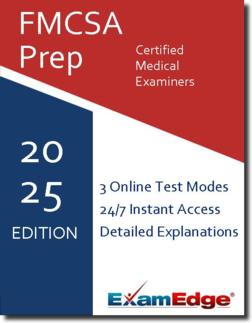FMCSA Certified Medical Examiner Practice Tests & Test Prep - Topics
Based on 40 Reviews
- Real Exam Simulation: Timed questions and matching content build comfort for your FMCSA Certified Medical Examiners test day.
- Instant, 24/7 Access: Web-based FMCSA Certified Medical Examiners practice exams with no software needed.
- Clear Explanations: Step-by-step answers and explanations for your FMCSA exam to strengthen understanding.
- Boosted Confidence: Reduces anxiety and improves test-taking skills to ace your FMCSA Certified Medical Examiners (CME).

Understanding the exact breakdown of the FMCSA Certified Medical Examiners test will help you know what to expect and how to most effectively prepare. The FMCSA Certified Medical Examiners has multiple-choice questions The exam will be broken down into the sections below:
| FMCSA Certified Medical Examiners Exam Blueprint | ||
|---|---|---|
| Domain Name | % | Number of Questions |
| DRIVER’S MEDICAL INFORMATION | 70% | 35 |
| Identification and History | 20% | 10 |
| Physical Examination and Evaluation | 25% | 13 |
| Diagnostic Tests and/or Referrals | 18% | 9 |
| Documentation of Ancillary Information | 7% | 4 |
| DETERMINATION OF DRIVER’S QUALIFICATIONS AND DISPOSITION | 30% | 15 |
| Health Education Counseling | 4% | 2 |
| Risk Assessment | 14% | 7 |
| Certification Outcomes and Intervals | 12% | 6 |
For a more comprehensive list of the topics that may appear on the NRCME test, review the most current FMCSA Medical Examiner Handbook and the FMCSA resource center.
How to Prepare for the FMCSA CME Exam
Step 1: Check Eligibility and Apply
Before you can take the certification exams, you must first meet the eligibility requirements. For the CDL, this typically includes being at least 21 years old (or 18 for intrastate travel), having a valid driver's license, and passing a medical exam. For the CME, you must be a licensed medical professional (doctor, nurse practitioner, physician assistant, etc.). Once you meet the eligibility requirements, you can apply for the exams. For the CDL, you will need to apply through your state's Department of Motor Vehicles (DMV). For the CME, you will need to apply through the FMCSA. The applications can typically be found on the respective websites.
H3: Step 2: Schedule the FMCSA CME Exam
After your application has been accepted, you can schedule your exam. For the CDL, this will likely be done through your state's DMV. For the CME, you will schedule your exam through the FMCSA. You can typically schedule your exam online or over the phone.
Step 3: Study and Practice
Once you have registered for the exam, your NRCME prep journey begins! Be sure to include regular FMCSA practice tests to measure your progress and help prepare you for success.
Step 4: Take the Exam
Once you have scheduled your exam, you can take it at the designated testing center. For the CDL, this will likely be at a DMV office or other approved location. For the CME, this will be at an approved testing center. The locations for the testing centers can typically be found on the website.
Location Information and Website
The FMCSA is headquartered in Washington, D.C., but the exams are offered at locations throughout the United States. You should check with your local DMV or the FMCSA website to find the nearest testing center. The website includes information on the CDL and CME certifications, including eligibility requirements, application processes, and testing locations.


